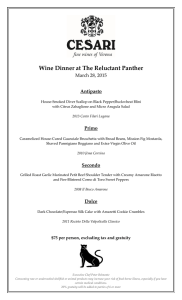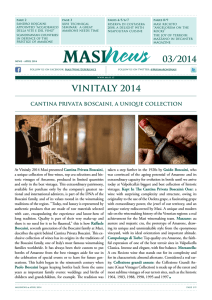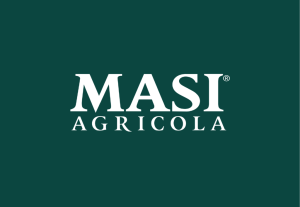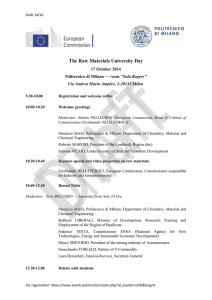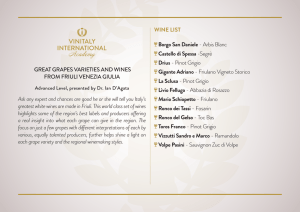in the vineyards
advertisement
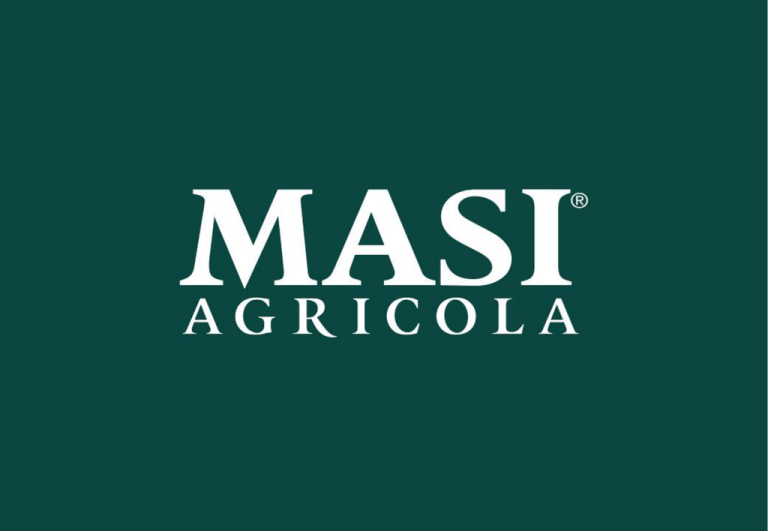
Amarone, a unique Wine Gargagnago di Valpolicella date Masi Mission The production of high class wines, rooted in the values of the Venetian territory, using principally native grapes and traditional production methods, with constant technological updates, contributing to raise the image of Venetian wines to the highest level on an international basis History and Family • • • • • Vajo dei Masi (“Masi little valley”): first vineyard acquired in Valpolicella in 1772 Owned by Boscaini family, vine-growers for more than two centuries The company, established in Valpolicella Classica, land of Amarone, expanded in the best winemaking Venetian areas Masi is world famous for being a specialist and an innovator Now exports its expertise outside the Venetian area, in Tuscany and Argentina Masi Technical Group • • • • • The product of a unique idea: the single role of the winemaker is carried out by a complete team of experts in viticulture, enology and marketing The heart of the company in technical matters, production and research for all wineries Works in partnership with technical bodies and universities for research and development Objective: the rationalisation and updating of the viticultural and oenological heritage of the Venetian regions through production for the Group and communication The MTG is responsible for the technical progress and high quality of the company’s wines Cellars for applied Experimentation Technical Seminar Nasa System Experimental Vineyard The Vineyards • • • Masi makes wines in the best viticultural areas of the Venetian regions, employing the most favourable hillside and foothill vineyards The company also has on-going projects in Argentina and Tuscany (the latter in collaboration with Conti Serego Alighieri) Vineyards are either wholly owned or under company control. Their management is entirely entrusted to Masi Technical Group through the Quality Grapes Project Vineyards Venetian Area Tuscany Argentina 1285 Land Total 960 hectares 185 hectares 140 hectares The Vineyards - the Venetian Area • • • Veronese: vineyards in the “classico” zones, with suitable terrain and optimum orientation to the sun (640 hectares in production, of which 120 are part of the historic Conti Serego Alighieri estate) Friuli: 280 hectares in production growing traditional red varieties and Pinot Grigio Trentino: 40 hectares in production managed in partnership with Conti Bossi Fedrigotti, one of the biggest and finest vineyard holdings in the area Pol Bussolengo San Ciriaco Valpolicella Colbaraca Soave La Vegrona Bardolino Stra’ Del Milione Friuli Fojaneghe Trentino The Vineyards - Tuscany • • • • Together with Conti Serego Alighieri, Masi has acquired the “Poderi del Bello Ovile” estate in Cinigiano, on the edges of Montalcino This purchase marks the return of the Alighieri to Tuscany The estate comprises 70 hectares of vineyards in production The “Pian di Rota” estate in Montalcino (115 hectares, of which 45 are vineyards) is managed in partnership Poderi Del Bello Ovile Poderi Del Bello Ovile Poderi Del Bello Ovile Pian Di Rota The Vineyards - Argentina • • • Masi has developed the “Argentinean nature, Veneto style” project at Tupungato in Mendoza Masi has taken the vines, winemaking techniques and oenological style typical of the Veneto to Argentina “Vigneti La Arboleda” comprises 140 hectares, of which 100 are already in production The Vineyard The Cellar Reservorio The „Corvina House“ Viticulture Quality begins in the vineyards. This is the simple but profound philosophy of Masi Agricola, which: • uses targeted and professional vineyard practices • marries the experience of tradition with modern research • aims to maximise quality, personality and character in every vineyard Thinning of the Green Bunches Guyot Grapes • Masi Agricola uses mostly indigenous grape varieties, native to each production area. Pictured here are some of those used in the appassimento process: Rondinella Corvina Molinara Oseleta Malbec Refosco Carmenere Verduzzo Malbec Torrontes Specialization: Making Wines Using The Appassimento Process • • • The appassimento method of drying grapes on bamboo racks to concentrate aromas and tastes is traditional for the Venetiae area Appaxximento certifies Masi’s expertise in this technique in the XXI century All Masi wines made with this technique carry a certifying logo on the back label Appassimento: How and Why How it happens: Effect produced: • • • • • • Careful selection of the best bunches Bunches placed on bamboo racks or plateaux by expert hands Natural environment for Appassimento, assisted by NASA ( Natural Appassimento Super Assisted) when necessary Long drying period can last through the winter • • Loss of weight (30-40% average) Concentration of colour, sugars, aromas and tannins Noble rot affects particular grapes – botrytis produces glycerine and therefore smoothness Evolution of aromas from primary to complex The Various Uses Of Appassimento 1 2 3 1 - 100% Appassimento 2 - Double Fermentation 3 - the Blend (made from both fresh and semi-dried grapes) Amarone, An Historical Wine • Reticum: the original sweet wine produced with semi-dried grapes at Roman times. The poet Virgilio considered it as the second best wine after Falerno • Acinaticum: was called by Cassiodoro, minister of king Theodric, in the V century a.C. • Recioto: the word could derive from: - recia = ear, upper part of the bunch, rich in sugars - recisus = cutted - racemus = bunch • Traditionally called Recioto Amaro, or Recioto Amarone as the first regulations called it in 1968 • Recioto della Valpolicella (1991) Amarone della Valpolicella (1991) Amarone, A Unique Wine A. Production area B. Local grape varieties C. Winemaking technique D. Wine characteristics A - Production Area The heart of the production is the Valpolicella Classica zone, a hillside amphitheatre between Verona and Lake Garda, where temperate climates prevail. B - Local Grape Varieties CORVINA (must be 40-80%) • reinforces the character of the wine • adds little to either colour or tannin content • the most susceptible grape to glycerol forming Botrytis (Noble Rot) during appassimento RONDINELLA (must be 5-10%) • gives the wine colour, tannins and typical aromas • resistant to Botrytis during appassimento MOLINARA (optional addition of up to 10%) • gives supporting acidity and unusual drinkability to the great structure of Amarone OSELETA (optional addition of up to 10%) • gives great tannic concentration and exceptional colour • a native grape rediscovered by Masi in the 1980s C – Winemaking Technique IN THE VINEYARDS: • Just hillside vineyards • Preferred orientation: south, south-west IN THE DRYING LOFT: 100% appassimento of the grapes • Long drying process (from end of September to end of January) • Light attack of Botrytis • Weight loss (35-40%) IN THE CELLAR: • Soft crashing of semi-dried grapes • Long on-skin fermentation at natural winter temperatures • Completing first and malolactic fermentations in large casks (60-90 hl) • Maturation in fusto veronese (600 l barrels), from two to four years, depending wine type D – Wine Characteristics 20 15 10 5 Sangiovese Toscana Amarone Classico Valpolicella Tannat Uruguay Taglio Bordeaux Francia 0 Cabernet Sauvignon California Gl yc e r i n (g m / l ) Av e r ag e g l yc e r i n e c o n t e n t (g m/ l ) i n t o p w i n e s o f t h e w o r l d Type o f Wi n e • • • • • • • Wine with outstanding nobility, balance and strength Well rounded and velvety without excessive tannins or acidity High glycerine content gives great drinkability and softness (see graph) High alcohol content Long ageing potential Over time: unusual maturation curve in bottle and complex aroma evolution Climatic conditions during the growing and appassimento phases make the difference between each vintage Evolution Of Amarone - 1 Old Style Amarone • • • • Viticulture: - exasperated selection of the bunches (just the „recie“) - casual grapes blend Appassimento: - very long drying periods - occurrence of botrytis left completely to chance and to natural conditions Vinification: - rustic technology - long haphazard fermentations Barrel ageing: - very long times - exclusive use of large old oak barrels Evolution Of Amarone - 2 Modern Style Amarone • • • • Viticulture: - Constant modernisation and rationalisation in viticultural technique - increased percentage of Corvina Appassimento: - natural drying aided by technology - temperature, humidity, ventilation and weight loss are controlled by NASA system Vinification: - biotechnologies (selected yeasts) - regular and shorter fermentations - malolactic fermentation under control - maximum concentration, minimum oxidation Barrel ageing: - shorter times - use of smaller casks like „fusto veronese“ and new wood Vintage Assessments • Masi indicates ***** on the label LEGEND: nc = not classified Other **** or ***** star vintages were: 1946, 1948, 1952, 1953, 1955, 1957, 1958, 1962, 1964, 1967, 1969, 1971, 1974, 1976, 1979, 1983, 1985, 1988. NB: In 2002 only one wine was produced (Amabile degli Angeli Recioto) due to the violent hailstorms on August 4th. The *** rating therefore applies only to this wine SOURCES: • Masi Technical Group (ratings: *nc **fair ***good ****very good ****excellent) • Gambero Rosso “Vini d’Italia” (ratings: ° to°°°°°) • Bruno Donati for Unione Italiana Vini (*nc **fair ***good ****very good *****excellent VINTAGE MTG Enotria Gambero Rosso 1989 *** °° 1990 ***** °°°°° 1991 *** °° 1992 ** * ° 1993 **** **** °°°° 1994 **** ** °° 1995 ***** *****1 °°°° 1996 ***/**** ** °°° 1997 ***** ***** °°°°° 1998 *** ***** °°° 1999 **** *** °°° 2000 **** *****1 °°°° 2001 **** *** °°° 2002 nc/nb ** °° 2003 **** **** °°° 2004 **** **** °°°° 2005 **** **** °°°° 2006 ***** Annata storica °°°°° 2007 ***** ****½ Masi Leading Amarone Producer • Masi’s range of Amarone wines has enabled the company to develop its expertise in Appassimento • Masi currently produces as many as five Amarone wines, the widest and most expert range on the international market • This is why Masi is considered a world leader in the production of Amarone Our Five Amarone Wines • • • • • Costasera Masi: international benchmark for modern Amarone Riserva di Costasera Masi: special cuvée of Costasera. Using Oseleta in the blend makes it post-modern Mazzano Masi: “perhaps the most authentic and certainly the most prestigious vineyard for the Valpolicella speciality called Amarone” (Jancis Robinson) Campolongo di Torbe Masi: unique personality from volcanic soil Vaio Armaron Serego Alighieri: with character derived from a centuries old aristocratic tradition The Wineries of the Group • Masi estates in the Venetian regions • Azienda Vigneti La Arboleda, at Tupungato in Argentina • Possessioni dei Conti Serego Alighieri • Conti Bossi Fedrigotti estates, at Rovereto in Trentino The Families of Wines Classified according to Production Tecnique and Origin The Families of Wines Classified according to Place of Origin • From the Venetian regions: – Masi and Serego Alighieri Amarone and Recioto wines – Masi and Serego Alighieri Supervenetian wines – Masi and Serego Alighieri Classic wines • From Tuscany: – Red Tuscan Serego Alighieri “in Toscana” wines • From the Trentino: – Bossi Fedrigotti Trentino wines • From Argentina: – Masi Tupungato Argentinean wines Tasting 1. 2. 3. 4. 5. Masi Costasera 2006 Serego Alighieri Vaio Armaron 2004 Masi Riserva Di Costasera 2005 Masi Campolongo Di Torbe 2004 Masi Mazzano 2004 Masi Costasera Amarone Della Valpolicella Classico Doc • • • • Costasera: the slopes facing the sunset in Valpolicella Classica, where the day is longer and the vines facing the Lake Garga benefit from the reflection of its light and from its mild climate Millenary method of drying the grapes naturally aided by technology (NASA) Enjoyable already when young, it ages more than 30 years! Ideal with red meats, game and mature cheeses. Great after-dinner wine Serego Alighieri Vaio Armaron Amarone Della Valpolicella Classico Doc • • • • • • • Produced in the estate of Count Serego Alighieri, descendant of Dante Prestigious cru vineyard 65% Corvina, 20% Rondinella, 15% Molinara Serego Alighieri 3-years-ageing in large barrels including a 4-months-passage in cherry wood casks Amarone of traditional style, rich, velvety, giving a characteristic illusion of sweetness Only released in great vintages An ideal accompaniment for afterdinner conversation + Masi Riserva Di Costasera Amarone Della Valpolicella Classico Doc • • • • • • • • • Special “Riserva”of Costasera – the 5th Amarone that credits Masi as Leading Amarone Producer Costasera: Hillside vineyards on slopes facing the sunset 70% Corvina, 15% Rondinella, 10% Oseleta, 5% Molinara The Oseleta grape confers greater tannic structure and deeper colour Long appassimento: more than 120 days Aged for a long time (38-40 months) in larger casks and partially in new oak barrels of 600 litres (fusto veronese) Limited production Majestic, complex and elegant wine, with great ageing potential Good with red meat, game and mature cheeses. Excellent finale to a meal Masi Campolongo Di Torbe Amarone Della Valpolicella Classico Doc • • • • • • Unique and prestigious vineyard (1194) first Masi cru proposed in 1958 only released in great vintages and in small quantity ages 3 years in Slavonian oak barrels of 30-40 hl and in 600 litres oak barrels unique for power, elegance, complexity and attractive sweetbitter aromas delicious drunk on its own at the end of a meal, or with red meats, game, or strongly-flavoured dishes in general Masi Mazzano Amarone Della Valpolicella Classico Doc • Unique and prestigious vineyard (1194) • second Masi cru proposed in 1964 • only released in great vintages and in small quantity • ages 3 years in 600 litres casks • amarone with great style: powerful, complex, austere, therefore modern • delicious drunk on its own at the end of a meal, or with red meats, game, and with mature Pecorino and Parmesan cheeses The Veneto is a land of colours, Sound and flavours, From nature to art, to the savour of life. www.masi.it
